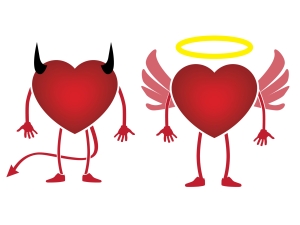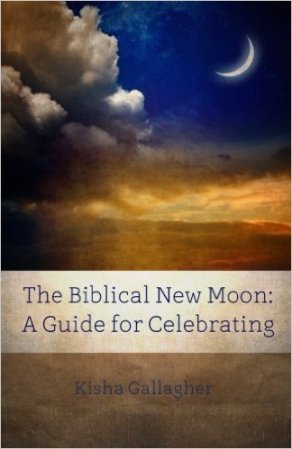Two Hearts?
In the last post on Matters of the Heart Part I, I laid the foundation for the Hebraic and Biblical understanding of the heart or the lev/levav. As I was researching this Hebrew word, I discovered that the Rabbis have long understood the dual nature of the human heart. (No surprise there.) I mentioned in Part I that this duality is most akin to us being double-minded, since the lev is also our mind.
But the Rabbis take this a step further and make a Midrash on the fact that the Hebrew word for heart comes in two forms: lev and levav. Even looking at these transliterations, you can see that the latter form has a “doubled” vet. The Rabbis point out that we each have TWO hearts or two conflicting impulses (good and evil) at the core of our being. The lesson isn’t that we are to neglect the evil inclination and strengthen the good inclination, as we might assume. Rather, a truly righteous person will yoke both inclinations to the mitzvot or commandments of God in order to direct us toward godliness.
This may seem strange to our Greek minded nature. But the Rabbis make a point that we often miss. The evil inclination is really our nephesh. It is our fleshly desires, appetites, emotions, will, and intellect. It serves a godly purpose IF we bring it into obedience to the Word of God. The strong urge or desire to procreate is only evil when it not sought within the holy bounds of matrimony. The drive to expand our territory is good if that expansion is for the Kingdom of Heaven. Without the “evil” inclination aspect of our levav, we would have no passion, drive, or desire to accomplish anything.

Photo by Axel Holen on Unsplash
The analogy that best describes this lesson of the sages is witnessed in our domesticated beasts or animals. My son and I just finished reading Black Beauty by Anna Sewell. Many of you will be familiar with this classic, but for those of you that are not, it is a tale about the life of a horse named Black Beauty. Beauty grows up around people and learns to work hard early in life. He is a gentle and loving horse, but faces many challenges as he is bought and sold numerous times, sometimes to good men and other times to cruel ones. Beauty is the epitome of a tamed beast. He is well trained and desires to please his masters. As a matter of fact, the owners that take good care of him and show him love, mercy, and compassion only makes Beauty a better work horse and companion. Beauty grows to love and trust them and their families. His diligent service in these homes is driven by love rather than fear (of punishment).
Along his journey, Beauty meets many other horses and hears their life stories. Those that had a wild or cruel upbringing have “issues” with man. They fear giving new owners their trust and often step out of line in disobedience or ignorance. Beauty is grateful for his loving upbringing and sound instruction when he hears stories like these, for he knows that had he not known love, compassion, and gentle training when he was young, he might have the same struggles as his new friends.
While reading this old story again after many years, I have been struck by it in a profound way. We, like Beauty, are also (partially) a beast (nephesh). And like his friends, our upbringing has a great impact on our future. Those of us raised with godly parents that gently guided us have advantages, and in some cases, less “issues” than those that didn’t. This in no way implies that those less fortunate in their upbringing cannot overcome through Messiah. But I can’t help but to recall the Creator’s mandate that we are to diligently teach our children. These words aren’t arbitrary. They are purposeful and would not be in the Torah if obeying this commandment didn’t have a direct impact on the us, our children, and the earth.

Photo by Mikael Kristenson on Unsplash
But that isn’t what impressed me the most about rereading Black Beauty. Mrs. Sewell went into great detail about the proper and improper handling, training, and treatment of horses. It was as if Adonai was speaking to me through this children’s story about our “older” nature, our nephesh, the beast. Our nephesh must be broken in and tamed just like the wild stallion. We must bring it into the submission of our renewed spirit that is ruled by Messiah, the Living Word of Elohim.
All those wild passions, strengths, and desires must be broken and reforged for a NEW purpose – to serve HaShem and our fellowman. In other words, that part of your heart (levav) that likes to have its way instead of doing what you “know” to do is really an unruly and untamed BEAST. It is just as strong and powerful as the majestic Black Beauty. It must learn to serve the master (your spirit) and the Master of masters, Adonai. If this nature is brought into obedience, great things will happen. Think of how much more a man with a work horse can do in the field than one without one!
The Beast Within
The Scriptures that reference our heart, mind, and soul are meant to instruct one about how to tame the “older” nature and bring it into submission to YHWH. When taming and training a beast of the field, we understand that it is a PROCESS . It doesn’t happen overnight, but through persistent, faithful, and consistent training. This natural picture of a greater spiritual truth should bring encouragement to those who still struggle with particular areas of obedience. (Which if one is honest, is all of us!)
As I was meditating on this practice and Black Beauty, it became clear as to why it is so important to search out the “roots” behind many of our struggles. These (bad) roots would have been formed when we were young or could be a generational issue.[1] Conversely, they could form as we age as a response to unfair, abusive, or hard circumstances.
These “roots” are basically made-up of thoughts and agreements with falsehoods. In other words, our lev or levav has rooted itself with a wrong mindset which brings about incorrect feelings, actions, words, attitudes, and deeds. How can one break free and walk, live, or think another way unless he is taught with much patience and kindness? Like Black Beauty’s friends, it takes the long suffering of a good trainer to help the beast see that there is a better way to behave and that some people really can be trusted.

Photo by sue hughes on Unsplash
Although godly people are the key to one hearing and receiving the Good News, we have our own homework to do as well. Please don’t misunderstand that last statement. I’m not inferring that the Gospel isn’t enough or that it must be earned. What I am saying is that once you RECEIVE the truth, you must learn to walk in it, if you truly desire to be an overcomer with abundant life. I’ve met many people that were saved by the grace of God, but they were still living with much pain from the past, patterns of broken relationships, and remained in bondage in some areas.
Many would suggest these people are in need of deliverance and I agree with that counsel. However, most references in the Bible about deliverance are about salvation and rescue from physical enemies or adversaries. Not all of our ailments and problems come from the outside. Many are issues of our heart (lev) which have been left unchecked because we SEE no other alternative or we just don’t know HOW to get from point A to point B. We have no clue as how to rein in the beast (nephesh/flesh) and change for the better. This is where the washing of the water of the word becomes our guide to success.
Eph. 5:26-27 So that He might sanctify her, having cleansed her by the washing of water with the word, (27) that He might present to Himself the church in all her glory, having no spot or wrinkle or any such thing; but that she would be holy and blameless.
What I’m really speaking to here is sanctification, not deliverance. I personally believe that some people fail to receive deliverance in certain areas because the problem isn’t about an outside force or enemy, but an inward (heart) issue that is in need of cleansing and circumcision. That which is neglected is the MIND or heart, the lev or levav.
Tit. 2:11-15 For the grace of God has appeared, bringing salvation to all men, (12) instructing us to deny ungodliness and worldly desires and to live sensibly, righteously and godly in the present age, (13) looking for the blessed hope and the appearing of the glory of our great God and Savior, Christ Jesus, (14) who gave Himself for us to redeem us from every lawless deed, and to purify for Himself a people for His own possession, zealous for good deeds. (15) These things speak and exhort and reprove with all authority. Let no one disregard you.
Are you zealous for good deeds? I like to think that I am until I am tested, and then the real truth of what is in my heart comes forth. This is why we are tested in the first place, so we can what really lurks in its depths. We tend to think that “tests” are huge and obvious. Most are not. Instead, the majority of how and when we are tested is in our everyday life – those things we perceive to be non-consequential or minor.
For example, you’re running late for an appointment and every possible delay seems to prevent you from getting there on time. Each obstacle heightens your anger a little more. Eventually, you find yourself trying to enter a heavy traffic highway, and not one car is willing to let you in. Finally there is a tiny break, so you hit the gas and squeeze onto the highway. But, the packed highway only inches along. You find yourself sitting through every traffic light multiple times. Your frustration, anger, and blood pressure continues to rise. Suddenly, you see another car trying to enter the street like you did a few minutes ago. The traffic stops near them, and you have a choice to make. Do you let them in? Who knows how long they’ve sat there trying to turn? Any other day, your kindness would allow them to enter just in front of you. But today, you’ve reached the point of “beyond late” to your appointment. Do you let them pass anyhow, knowing it may cost you passage through the next stop light? Or, do you justify your selfishness because you are late for a very important date?
Does that example seem too “small” of an issue to really matter? What about this one?
It seems as though every day you have to remind your son to do what he knows to do – clean the cat box and take out the trash. Without fail, every day you are forced to remind him. This constant cycle has you immensely frustrated. Today has already been a trying day with other matters. Do you grab him by the ear and drag him to the cat box and demand he fulfill his duty? Do you scream and shout out of exasperation? Do you mete out severe punishment while furious? Or do you slip into indifference and apathy and do his job yourself? There are so many choices as to how to respond. Which one, if any, is correct and supports the notion that you are godly and zealous for good deeds? How would Yeshua respond?
How about this one? Your spouse has a bad habit that drives you up the wall. Maybe it’s leaving the toilet seat up. You’ve kicked, screamed, cried, begged, and pleaded that he do this one simple thing for you. Why won’t they just do this one thing? Do they not love me? Why? Why? Why? Today you sit down to do your business and… ker-plop! Your bottom touches the cold ceramic edges of a seatless loo and you barely miss falling into the water. Immediately your blood pressure skyrockets. As usual, your response is to rush into the other room to announce (yell) your disdain for your spouse’s carelessness. Your spouse goes on the defensive at your furious tantrum. Shalom in the home flies out the window along with any and all of your sensibilities. The evening is completely spoiled, the children have witnessed yet another verbal outburst with tears and slamming doors and the whole house is now on edge. Any plans for family time have been lost. Reading Scripture together as a family is reserved for another day. All this because your precious bottom touched a little potty water. Worst of all, you feel justified in your actions. All blame goes to the REAL guilty party: your spouse!

Photo by Giorgio Trovato on Unsplash
While it is true that your spouse needs to be more respectful of your wishes (and your tuchas), he is NOT the villain in this little tale. You are. His little oversight didn’t wreak havoc in your household and teach your children the “wrong way” to handle life’s problems. It wouldn’t be surprising if YHWH was allowing him to continually “forget” the toilet seat in order to teach you a lesson.
Now replace any of the scenarios above with issues you seem to face again and again. Who is the one in need of more training? I firmly believe that Adonai works on multiple levels. Even when it comes to correcting our children, there is an opportunity for us to be corrected as well. Repetitive issues should grab our attention the most. Apparently we are NOT passing the exam, and it’s usually because we are oblivious to our own need for “correction.” Pride and self-justification can mask a plethora of character issues. The focus shouldn’t be on our fellow man’s problem. It should be our own! Didn’t Messiah say something about this very thing?
Mat. 7:3-5 “Why do you look at the speck that is in your brother’s eye, but do not notice the log that is in your own eye? (4) Or how can you say to your brother, ‘Let me take the speck out of your eye,’ and behold, the log is in your own eye? (5) You hypocrite, first take the log out of your own eye, and then you will see clearly to take the speck out of your brother’s eye.
Today, I will leave you to ponder the issues of you own heart during these last days of the month of repentance (Elul). The fall Moedim (feasts) are quickly approaching and they truly are all about the heart! I’ve actually written this second part multiple times over the past weeks. There are so many facets to this topic that I’ve had a hard time deciding which angle to take. The next one will hopefully expand upon this post and offer some solutions to the dilemma that seems common to us all: How do we prepare and practice in order to pass the myriad of life’s tests for our souls?
[1] My understanding of “generational curses” is more akin to the passing along of unholy thinking. For example, if all you ever learned as a child was to “deal” with life by over drinking, then you will probably mimic the actions of the parent that presented you with this “way of life.” It’s as if you see no other course of action or another way in which to go (walk). The same could be stated for issues such as abuse, depression, poor work ethics, obesity, drug abuse, thievery, anger, etc. There is a reason why we are commanded to teach our children in the way that they SHOULD go. Most children watch everything their parents do for good or for evil. Later when they are an adult themselves, when life presents them with opportunity (and it always will), most will choose to follow the path taken by their parents, even if they hated the parents actions as a child, because that is the only “way” they were taught. The mind (lev) only has experience with what it has been taught or trained for; thus, without the transforming power of the Word, most will follow the footsteps of their earthly trainers (parents/guardians). This is a vicious cycle and indeed a curse. Thank Heaven we have the Living Word to show us the way of truth, life, and blessing!






Thank you for this article! It is so rich that I will need to read it several times! Your examples are ‘right-on!’
LikeLiked by 1 person
Thanks, Deborah! You encourage me as usual! 🙂
LikeLike
I agree, the examples are spot on! Also, my children recently pointed out the fact , as we have been studying Genesis together, that Abraham, Sarah, Isaac, Rebeka, and Jacob all showed favoritism to one child and it got them into trouble. They can’t understand how the children didn’t learn from experience and their parents /grand parents mistakes in showing favor and turn around and do the same to their own children! What hardship our attitudes cause us and yet we cannot seem to find it within ourselves to change it. To the hope of the New Covenant ! Where are hearts are exchanged and the Torah flows from within us! Jeremiah 31:33 ” For this is the covenant I shall make with the house of Israel after those days, declares YHVH: I shall put my Torah in their inward parts, and write it on their hearts.” Thank you once again, for your insightful and timely posts. Shalom
LikeLiked by 1 person
Cydnie,
What an astute observation your children made! (Out of the mouth of babes!) That’s truly an area that we must guard against and isn’t often mentioned. And yes, our attitudes… what shall we do with them? It will be quite a change when we walk in the fullness of the New Covenant to be sure. Thanks for taking the time to comment and for your encouraging words!
Shalom,
K
LikeLike
Pingback: Matters of the Heart Part III | GRACE in TORAH
Pingback: Matters of the Heart Part I | GRACE in TORAH
Pingback: The Mark of the Beast Part II | GRACE in TORAH
Now it is as clear as day that the serpent is in us and with the help of Messiah, we shall overcome.
I found you when I needed you. Thank you.
LikeLiked by 1 person